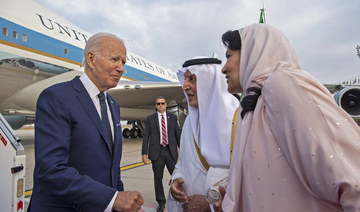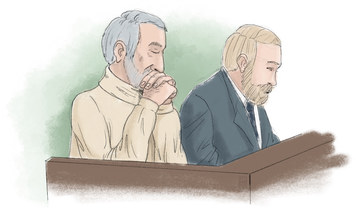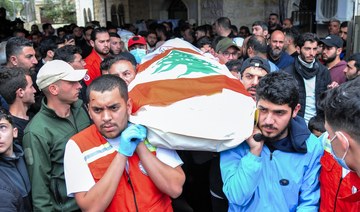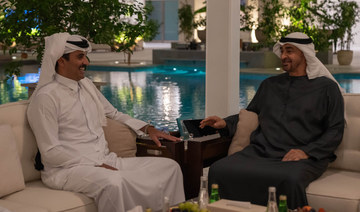DUBAI: The top US Air Force general in the Middle East warned on Thursday that Iran-backed militias could resume attacks in the region against the United States and its allies as tensions rise — assaults that could lead to a new Mideast escalation.
Speaking to journalists before stepping into his new role at Al-Udeid Air Base in Qatar, with responsibility for military operations in Iraq, Syria, Afghanistan, and across the region, Lt. Gen. Alexus Grynkewich also expressed fears over Russian and Chinese influence taking hold as superpowers vie for economic and military influence in the Middle East.
For instance, he said, recent US intelligence that Iran is preparing to send Russia armed and unarmed drones to use in its war on Ukraine “is not a surprise … but it’s concerning.”
Iran’s mission to the United Nations did not immediately respond to a request for comment.
Grynkewich, who had served as director of operations at Central Command in Tampa, Florida, thousands of miles from the baking desert outside of Doha, Qatar’s capital, spoke as regional tensions remain high over Iran’s rapidly expanding nuclear program and talks to revive Tehran’s nuclear deal with world powers at a deadlock.
“We’re in this position where we’re not under attack constantly, but we do see planning for attacks ongoing,” Grynkewich said. “Something will occur that unleashes that planning and that preparation against us.”
Iran tested a satellite-carrying rocket last month, prompting the White House to threaten more sanctions on Tehran to prevent it from accelerating its advanced ballistic missile program. And last week, as President Joe Biden toured the region, Iran unveiled armed drones on its warships in the Arabian Gulf.
Tehran has rapidly grown its stockpile of near-weapons-grade nuclear fuel in recent months, spreading fears about an escalation. It also has spun more advanced centrifuges prohibited under the landmark atomic accord, which former President Donald Trump abandoned in 2018.
“Everyone in the region is very concerned,” Grynkewich said.
Still in recent weeks, he said, US forces have seen a reduction in targeted attacks across the region, as a tenuous cease-fire between the Iran-backed Houthis and the Coalition to Restore Legitimacy in Yemen continues in the country and as an ongoing government formation process in Baghdad keeps Iran-backed militias in limbo, waiting for the political chaos to settle before they strike.
“We’re in a bit of a period of stasis,” Grynkewich said.
As other threats subside, the US has sharpened its focus on containing and countering Russian and Chinese influence in the region, Grynkewich said, noting that Russia is seeking to maintain the leverage it gained from years of military intervention in the region, such as in Syria where it helped save President Bashar Assad’s government and turned the tide of the war in his favor.
Grynkewich said an apparent reversal of the military relationship between Russia and Iran — with Moscow potentially interested in procuring drones from a traditional buyer of its own military equipment — “shows a bit more of a relationship than we’d like them to have, given the context of everything going on in Ukraine.”
Earlier this week, Russian President Vladimir Putin visited Tehran on a rare trip abroad and won staunch support from Iran for the war that has plunged the Kremlin deeper into confrontation with the West.
Meanwhile, China’s significant economic inroads in the region have raised concerns about the country’s plans “to secure those interests either through arms sales or other means,” Grynkewich said.
Despite appearances to the contrary after the withdrawal from Afghanistan, the US isn’t quitting the region, Grynkewich insisted, a case Biden made repeatedly on his Mideast tour last week.
With tens of thousands of American forces stationed across the Arabian Peninsula and some still in Iraq, as well as America’s superior military power, Grynkewich said, the US is trying to convince its allies that, “if you partner with us, you’re getting to get a relationship that’s much more deep and meaningful.”
Air Force official expects Iran to resume attacks on US
https://arab.news/cctq4
Air Force official expects Iran to resume attacks on US
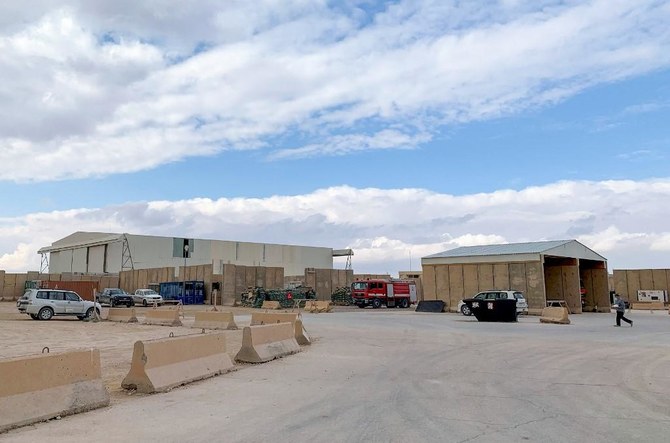
- “We’re in this position where we’re not under attack constantly, but we do see planning for attacks ongoing,” Grynkewich said
- Iran tested a satellite-carrying rocket last month
Israeli justices press government on religious conscription waivers

- The Supreme Court in 2018 voided a law waiving the call-up for ultra-Orthodox men who want to study in seminaries instead
- Ultra-Orthodox claim the right to study in seminaries instead of serving in uniform for the standard three years
In the name of equality, the Supreme Court in 2018 voided a law waiving the call-up for ultra-Orthodox men who want to study in seminaries instead. Parliament failed to come up with an alternative arrangement, and a government-ordered stay on a mandatory mobilization of ultra-Orthodox expired in March.
That has left Prime Minister Benjamin Netanyahu scrambling to agree with ultra-Orthodox coalition partners on a military service compromise that might preempt any Supreme Court ruling that Israel’s fasted-growing minority must be forcibly drafted.
“We’re not on quiet waters. We are at war, and the need (for military personnel) cries out,” one of nine justices hearing the case, Noam Solberg, told a government lawyer who argued that it was still too early for an ultra-Orthodox mass-conscription.
With fighting against Palestinian Hamas militants in Gaza and related violence on the Lebanese border exacting the highest troop casualties in decades, many Israelis resent their fellow citizens being spared their share of the risk.
The ultra-Orthodox claim the right to study in seminaries instead of serving in uniform for the standard three years. Some say their pious lifestyles would clash with military mores, while others voice ideological opposition to the liberal state.
The ultra-Orthodox make up 13 percent of Israel’s population, a figure expected to reach 19 percent by 2035 due to their high birth rates. Economists argue that the draft exemption keeps some of them unnecessarily in seminaries and out of the workforce.
The government’s lawyer, Doron Taubman, said it placed a high priority on increasing ultra-Orthodox enlistment.
“But it is also mindful of the enormous difficulty the community sees in the drafting of seminary students, both due to the cardinal fear of their lifestyle being compromised and the fear of Bible study being compromised,” he told the court.
It was not immediately clear when the court might rule in the case, whose first hearings took place in February.
Two Lebanese shepherds killed amid ongoing escalation along Lebanon-Israel border

- State news agency: The men were civilians who used to sell sheep milk to neighboring villages
- Clashes between Israeli forces and Hezbollah have escalated in recent weeks
BEIRUT: Two Lebanese shepherds were killed in an Israeli strike that hit their house in the town of Houla near the Lebanon-Israel border on Sunday, state media reported.
Lebanon’s National News agency said the men were civilians who used to sell sheep milk to neighboring villages.
Lebanese Agriculture Minister Abbas Hajj Hassan said in a statement that a separate Israeli strike Sunday morning had damaged his ministry’s office in the town of Bint Jbeil, as well as the city’s commercial market and local government headquarters.
Also Sunday, the Lebanese militant group Hezbollah claimed a drone attack on an Israeli military facility in the Golan Heights. It said the strike had hit a radar system for Israel’s Iron Dome air defense system, as well as forces operating it.
The Israeli military did not confirm damage to the radar system but said that two drones “were identified falling in open areas” and “as a result of one of them, a fire broke out adjacent to Katzrin in the Golan Heights and was extinguished shortly afterward.” It said no injuries were reported.
Clashes between Israeli forces and the Lebanese militant group Hezbollah, which have taken place near-daily since October, have escalated in recent weeks.
Israeli strikes have killed more than 400 people in Lebanon, most of them militants with Hezbollah and allied groups but also including more than 70 civilians. Strikes coming from Lebanon have killed at least 10 civilians and 15 soldiers in Israel.
Western countries, in particular the US and France, have come forward with a series of proposals for a cessation of hostilities on the Lebanon-Israel border. Hezbollah has refused to enter into an agreement until a ceasefire is implemented in Gaza.
Profile of new Kuwaiti crown prince Sheikh Sabah Khaled Al-Sabah

- On November 2019, the emir signed an order appointing Sheikh Sabah Khaled as Prime Minister
The Emir of Kuwait, Sheikh Meshal Al-Ahmad Al-Jaber Al-Sabah signed an order on Saturday nominating Sheikh Sabah Khaled Al-Hamad Al-Sabah as Crown Prince.
Born in 1953, Sheikh Sabah Khaled obtained a bachelor’s degree in Political Science from Kuwait University in 1977. He joined the Ministry of Foreign Affairs in 1978 as a diplomatic attaché, serving in the Arab Affairs Department from 1978-1983, and later joined Kuwait's Permanent Mission at the UN from 1982-1989.
Sheikh Sabah Khaled served as Kuwait's Ambassador to Saudi Arabia and Permanent Representative to the Organization of Islamic Cooperation from 1995-1998, participating in GCC ministerial meetings during this period. He was appointed head of the Kuwait National Security Bureau at the rank of minister in 1998.
He was named Minister of Social Affairs and Labor in July 2006 and in March 2007, and served as Information Minister between May 2008 and January 2009. Sheikh Sabah Khaled was appointed Minister of Foreign Affairs in 2011 and later named Deputy Prime Minister, Minister of Foreign Affairs, and Minister of State for Cabinet Affairs in February 2012.
In December 2012, he was named Prime Deputy Minister and Foreign Minister. In January 2014, Sheikh Sabah Khaled was named First Deputy Prime Minister and Foreign Minister, retaining the post in December 2016 and again in December 2017.
On November 2019, the emir signed an order appointing Sheikh Sabah Khaled as Prime Minister and another order to address him as Sheikh Sabah Khaled Al-Hamad Al-Sabah. On December 14, 2020, Kuwait's late emir Sheikh Nawaf Al-Ahmad Al-Jaber Al-Sabah assigned Sheikh Sabah Khaled to form his second government and assigned him to form his third government on March 2, 2021. The late emir accepted Sheikh Sabah Khaled's resignation on November 18, 2021. The late emir then signed a decree assigning Sheikh Sabah Khaled to form the country's 39th government and his fourth.
Sheikh Sabah Khaled has received several prestigious awards: Saudi Arabia's late King Fahad awarded him the King Abdulaziz Order of the first class in 1998; former Sudanese President Omar Al-Bashir awarded him the Two Niles Order in 2012; Senegalese President Macky Sall awarded him the National Order of the Lion in 2015; and Palestinian President Mahmoud Abbas awarded him the Al-Quds Star Order in 2018.
Two Palestinian teens killed by Israeli gunfire in West Bank, Palestinian officials say

- A 16- and a 17-year-old were killed west of Aqabat Jaber refugee camp, near the West Bank city of Jericho
JERUSALEM: Two Palestinian teenagers were killed by Israeli gunfire in the occupied West Bank, the Palestinian health ministry said on Sunday.
The Israeli military did not confirm the deaths but said two suspects hurled explosives toward a local community, endangering civilians, and troops responded with live fire.
“Hits were identified,” the military said in a statement.
The Palestinian health ministry said a 16- and a 17-year-old were killed west of Aqabat Jaber refugee camp, near the West Bank city of Jericho.
Palestinian media said medicals teams were prevented from reaching one of the wounded and the other succumbed to his wounds on Sunday in a hospital in Jerusalem. One teen was shot in the head and the other in his chest, the Palestinian health ministry said.
The occupied West Bank, which Palestinians want as the core of a future independent state along with Gaza, has seen a surge in violence since the start of the war in Gaza last year, and a major crackdown by Israeli security forces which have made thousands of arrests.
UAE president, Qatar ruler discuss US president’s Gaza peace plan

- The two leaders agreed that civilians in Gaza must be protected in accordance with rules of international humanitarian law
DUBAI: UAE President Sheikh Mohamed bin Zayed Al-Nahyan welcomed the Emir of Qatar, Sheikh Tamim bin Hamad Al-Thani, who arrived in Abu Dhabi on Sunday.
The two rulers reviewed a number of regional and international issues, particularly the current humanitarian crisis in the Gaza Strip during their meeting, stressing the importance of intensifying efforts for an immediate and permanent ceasefire in the besieged enclave and providing protection.
They agreed that civilians in Gaza must be protected in accordance with rules of international humanitarian law, in addition to strengthening the response to their deteriorating humanitarian conditions.
The two sides also touched on the proposals presented by US Joe Biden regarding the crisis in the Gaza Strip.
They also affirmed support for all serious initiatives and endeavors that push towards stopping the escalation in the region, protecting the lives of all civilians ending suffering in the Gaza Strip, and pushing towards a clear political horizon for a just, comprehensive and lasting peace that is based on the ‘two-state solution’ and preserves the security and stability of the region.
Sheikh Mansour bin Zayed Al-Nahyan, vice president, deputy prime minister and chairman of the Presidential Court, and Sheikh Khaled bin Mohamed bin Zayed Al-Nahyan, crown prince of Abu Dhabi and chairman of Abu Dhabi Executive Council, were among the top UAE dignitaries who earlier accompanied their ruler for Sheikh Tamim’s arrival, state news agency WAM reported.
Sheikh Tamim meanwhile was accompanied by Sheikh Jassim bin Hamad Al-Thani, the emir’s personal representative, prime minister and minister of foreign affairs, along with a number of ministers and top officials.



